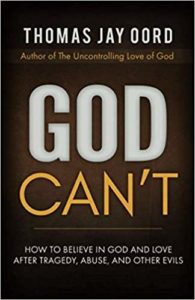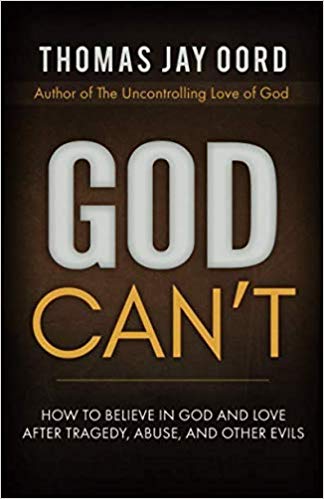 The classic theological puzzle known as the “problem of evil” arises when we assert the existence of an all-powerful God who is also perfectly loving, while also asserting the presence of genuine evil in the world. As David Hume puts the case: “Either God would remove evil out of this world, and cannot; or He can, and will not; or, He has not the power nor will; or, lastly He has both the power and will. If He has the will, and not the power, this shows weakness, which is contrary to the nature of God. If He has the power, and not the will it is malignity, and this is no less contrary to His nature. If He is neither able nor willing, He is both impotent and malignant, and consequently cannot be God. If he is both willing and able (which alone is consonant to the nature of God), whence comes evil, or why does he not prevent it?”
The classic theological puzzle known as the “problem of evil” arises when we assert the existence of an all-powerful God who is also perfectly loving, while also asserting the presence of genuine evil in the world. As David Hume puts the case: “Either God would remove evil out of this world, and cannot; or He can, and will not; or, He has not the power nor will; or, lastly He has both the power and will. If He has the will, and not the power, this shows weakness, which is contrary to the nature of God. If He has the power, and not the will it is malignity, and this is no less contrary to His nature. If He is neither able nor willing, He is both impotent and malignant, and consequently cannot be God. If he is both willing and able (which alone is consonant to the nature of God), whence comes evil, or why does he not prevent it?”
Very often, as in Hume’s framing above, the focus of efforts to approach the “problem” is on God. Can God? Should God? Is God? Why does/doesn’t God? In a departure from this, in this episode the panelists place greater attention on those who are currently, or who have, suffered great evil, and how traditional approaches so often fail them. In many cases, one of the costs of great suffering, especially when it does not arise as a natural consequence of something we did, is the loss of faith in God altogether. More atheists are created by the fact of genuine, massive, and seemingly unfair distribution of great suffering than any other trigger. Clearly, in such cases, an “omni-everything” concept of God fails as a being or power that is able to comfort those who suffer.
In a new book, God Can’t: How to Believe in God and Love after Tragedy, Abuse, and Other Evils, Christian and open-relational theologian Thomas Jay Oord directly faces the effects on individual faith that arise from evil. Through his posing and discussing five theological claims about God’s loving nature in relation to evil, many Christians, and we sense Latter-day Saints would as well, have at last found new hope and the kind of comfort and peace that only an explicit faith in God can bring.
Brittney Hartley and Mormon Matters host Dan Wotherspoon join Tom in discussing the ideas of his book, while contributing as they arise various places where Mormon thought is in close alignment with his theses. In the final section, they also discuss one large disconnect between Tom’s and wider Christianity’s view of God and that of Latter-day Saints: the question of whether God is embodied or not. It leads to a fascinating exchange, even as it primes the pump for many more explorations. We are grateful to Tom as an open-hearted, brilliant, and friendly conversation partner. Here’s to more episodes to come!
Please listen in! Share below!
_____
Link:
Thomas Jay Oord, God Can’t: How to Believe in God and Love after Tragedy, Abuse, and Other Evils (SacraSage Press, 2019)
Purchasing books and other items through Mormon Matters helps support the podcast. Click through the book above or on the button on the webpage. A percentage of anything you purchase on Amazon during that same visit is donated to Mormon Matters. Thanks!


Comments 8
Some of the thoughts that came to me while listening to this theological discussion was starting something like “School of Elders” (spin off from School of Prophets) where we can discuss things at much more deeper theological level than that which we currently are capable of reaching during Sunday School or Priesthood lessons.
In the past I have always made God limited in his scope and power otherwise he would surely intervene. The title of the book makes me think that he can’t, but understanding the reasons why would either require listening to this podcast again or buying the book.
You mentioned Blake Ostler and his thoughts on problems with a Mormon Process Theodicy. I did a whole series of podcasts with him on the problem of evil and we went over several theodicies available in Mormonsim. We went over a path through Mormon thought history how one could arrive at a ‘God Can’t’ type view. Then we go over what some issues might be with that. For those interested take a listen:
http://www.exploringmormonthought.com/2018/10/ep63-mormon-process-theodicy-vol-4.html?fbclid=IwAR07DTDbxDw1KeHG9saCHBsnP5FJ_Kk_R2PsdfKZ_8zv73FrRSFkLpFhqtg
I think I will check that out.
Later I thought it would have been nice to contrast Tom’s perspective with that of Terryl Givens with his book “The God who weeps”, most likely because “he can’t”.
Dan — listened to the podcast; loved the dialogue. Question — if I understand the theory being presented (that God cannot intervene with individuals/entities that have free will, even to the elements), how do you explain the “miracles” of Jesus. Healing (rearranging cells), calming storms (rearranging atoms/forces of nature), etc. Do you take these stories as mythical and that Jesus didn’t really do them because as “God” he can not do those things? Appreciate your thoughts. Thanks.
Brent – This is Thomas Jay Oord. I’m responding for Dan on this one.
My theory affirms miracles. It says every miracle involves both God’s action and creaturely cooperation or conducive conditions in creation.
In my book, The Uncontrolling Love of God, I devote an entire chapter to this issue. I recommend that chapter to you!
Thomas Jay Oord
Thanks Thomas. I’ll definitely check out your books. But without yet delving into those, what is the distinction between how you define a “miracle “ that God can do, and interventions that God cannot do?
To use a biblical example—Paul. God intervened and likely stopped lots of persecution and death in the process. Paul probably wasn’t looking for that change, so this intervention/miracle wasn’t exactly a willing or cooperative person until God stepped in. Can you put a distinction to why God in this and not in other harming situations where free will is involved?
Thanks again. Really trying to understand.
Fascinating discussion. I need to listen to it again. I found myself measuring these theories of God against my own experience. One of the most powerful phrases from the temple is “there is no other way.” Whatever capacity God has in relationship to us, it seems calculated to provide a path to development and becoming.
I am trying to reconcile the non-interventionist God with an experience in our town 30+ years ago. A mad man and his wife take the elementary school hostage with bomb designed to level the building. Beings dressed in white, minister to the children and provide words of comfort, instruction and warning. The bomb is accidentally triggered resulting in the death of the perpetrators, but no one else. The state bomb expert struggles to explain why the bomb didn’t function properly and kill everyone. The evidence is that God did intervene, interfering with the agency of the perpetrators and answered the prayers of parents and a community…and yet, did not in numerous other tragedies.
About Brittney’s comment on prayer and teaching kids:
When my kids lose something, I tell them pray and explain that they’re looking for it and to ask for help finding it. Then, when they’re done, I tell them to look every place they can think of, even places they know they’ve checked before. I try not to reinforce the “God gave it to me” approach, but instead the “helping” language that Thomas talked about using in his prayers. It’s a very practical approach to prayer and help from God–pray like it all depends on the Lord, and work like it all depends on you. I hope it also helps them learn to recognize the coming of “pure intelligence” that Joseph described:
http://emp.byui.edu/ANDERSONR/ITC/Book%20_of_Mormon/02_1nephi/1nephi01/1nephi01_05pureintelligence_js.htm
Or, put less elegantly, this back-and-forth from the movie “Hook”:
Smee: I’ve just had an apostraphe.
Hook: I think you mean an epiphany.
Smee: No … lightning has just struck my brain.
Hook: Well, that must hurt.
I don’t know if either of those descriptions (Joseph or Smee) are the Spirit prompting us, or just our neurons lining up the right way to help us remember where we put things we’ve lost. But the act of focusing, asking, and acting on the ideas that come seems to work for me, whether it’s looking for my wallet, thinking about who should be given a new calling or assignment at church, or how to approach a difficult problem at work.